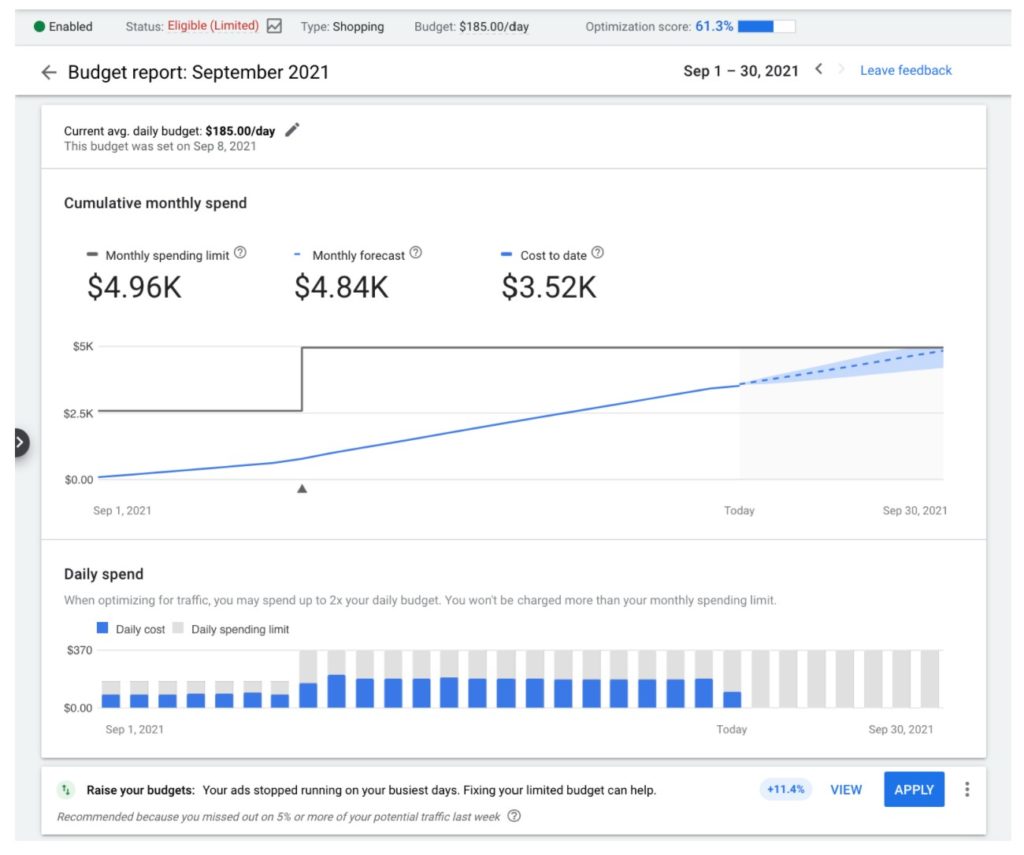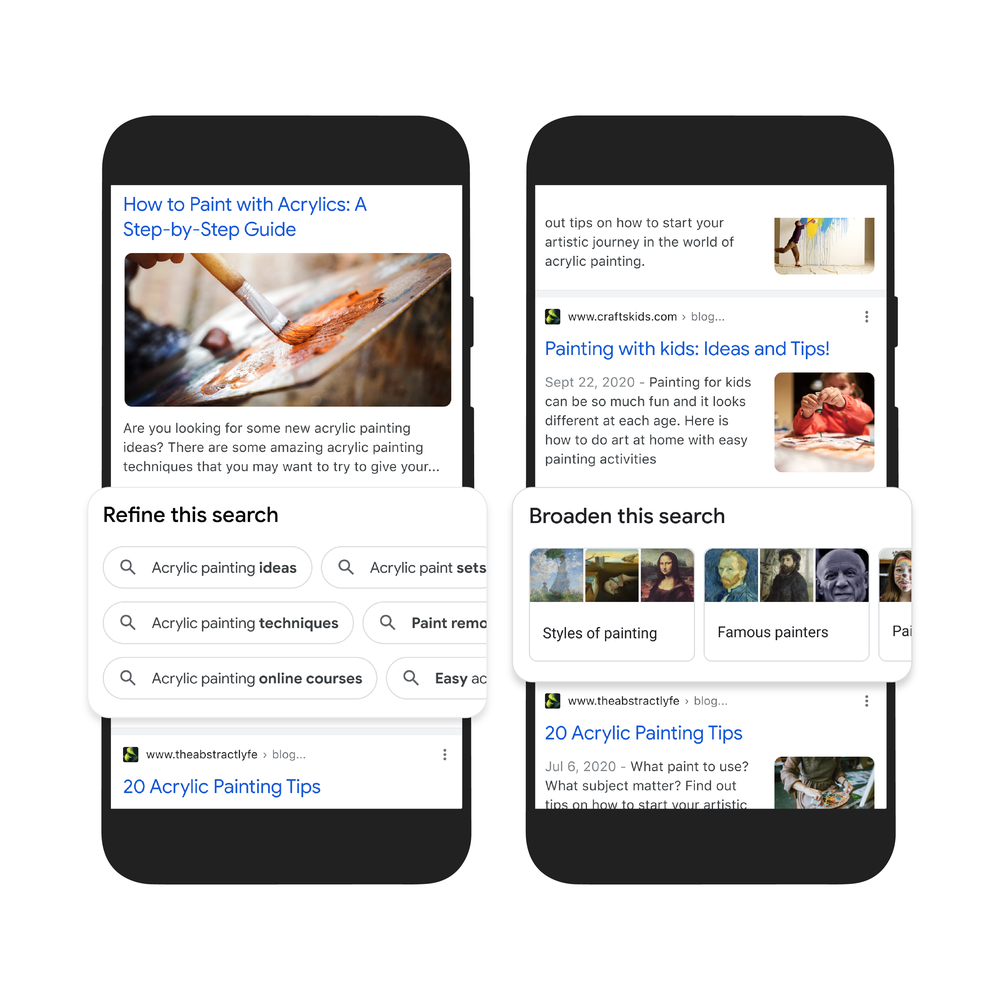This week: Google might index Instagram and TikTok content, YouTube adds more metrics in the Mobile Studio app, and there aren’t 200 ranking signals after all.
Here’s what happened this week in digital marketing.
New Google Ads Report Highlights Daily Campaign Spend
Love Google Ads but hate the fact that it’s so difficult to figure out how much you’re spending every day?
Well, that’s about to change.
A new report will show you both daily and monthly ad spend.
Here’s what Google has to say about the new feature: “Your budget report provides insight into how your spend is affected by your budget, as well as a breakdown of your daily spend throughout the month. If you change your average daily budget in the middle of a month, the budget report can show you what effect that change had on your spend and the maximum monthly spend.”
The report will also forecast how much you’ll likely spend next month.
Google Search Redesign Includes MUM
This past week, Google announced that its search algorithm will include MUM for some queries.
If you’re unfamiliar with MUM, it stands for Multitask Unified Model. It’s a way to search for answers beyond simple text-based queries.
With this update, Google will present answers as rich results and images instead of the standard 10-links-per-page output.
The new feature will require a redesign of the search results UI. And Google is working on that as well.
Here’s how it will work: if you search for a generic topic like “acrylic painting,” Google will show you a variety of topics related to acrylic painting in accordion format. Then, you can pick the one most relevant to your interest.
Additionally, the search engine will give you the ability to “zoom” in and out of related topics.
Finally, Google will show you visual results that you can explore and use for inspiration.
Interested in learning more about Google MUM? Learn more about Google’s new AI Tech now.
YouTube Adds More Metrics to Studio Mobile App
The YouTube Studio mobile app just keeps getting better.
As part of the most recent update, you’ll gain access to new insights.
First up, you’ll see new and returning viewer metrics. Both of those stats appear on the same line graph so you can compare them against each other.
YouTube also now offers members metrics. They offer details about paid subscribers who view your channel.
Finally, the latest video performance report now appears on the Studio dashboard just as it does on the desktop dashboard. That will give you quick insight into how much people appreciate your most recent production.

New YouTube Metrics
Google: URLs Are Case-Sensitive
Yes, it matters whether the letters in your URLs are uppercase or lowercase. So says Google’s John Mueller.
The subject came up this past week on Ask Googlebot on the Google Search Central YouTube channel.
Somebody asked if a website’s ranking can be impacted by the case of letters in the URL.
“By definition, URLs are case sensitive, and also things like slashes at the end do matter,” Mueller said. “So, technically, yes — these things matter. They make URLs different.”
When Googlebot discovers different versions of the same URL, it will crawl them all to determine which one “wins.”
Mueller says all that extra crawling might mean that it takes more time for Google to find additional content on your site.
Google Can’t Read Content Behind Captchas
If you’ve got some amazing content on your site and find yourself frustrated because competitors are scrapping it, you might be tempted to put some of that content behind a captcha.
Resist that temptation.
Googlebot can’t read anything behind captchas. So your content won’t get indexed.
The subject came up recently during a Google Search Central Office Hours hangout. Somebody asked John Mueller if captchas can impact SEO.
“Googlebot doesn’t fill out any captchas,” Mueller replied. “Even if they are Google-based captchas we don’t fill them out. So that’s something where if the captcha needs to be completed in order for the content to be visible, then we would not have access to the content.”
Google Is Indexing Instagram and TikTok Videos
I’m surprised it took this long.
Google is working on a deal with Facebook and ByteDance, the parent companies of Instagram and TikTok, respectively.
All we know at this point is that the details seem to be similar to the deal Google struck with Twitter back in 2015. That agreement gave the search giant access to a “firehose” of tweet data for indexing.
That’s why you see tweets in search results today.
But Google pays an annual licensing fee for access to that data. Undoubtedly, the company would need to pay fees for access to Instagram and TikTok data as well.
That’s probably where the talks are at right now.
We’ll see how this one plays out.
There Aren’t 200 Ranking Signals, After All
You might have heard somebody say that Google uses more than 200 signals to rank content. But Google is moving away from that figure.
This past week during the Office Hours hangout, somebody asked John Mueller which of the 200 ranking signals is most important.
Mueller said that he doesn’t like to rank ranking signals.
Then he said this: “[T]he other small thing there is we’ve kind of moved away from the over 200 ranking signals number because it feels like even having a number like that is is kind of misleading. In the sense that, Google has a spreadsheet with all of the ranking signals and they can just sort them by importance and tell me which ones they are and that’s definitely not the case like a lot of these things just take into account so many different things you can’t just isolate them out.”
Google: Don’t Put Sponsored Content in Category Pages
If you’re running an ecommerce site, it’s a good idea to avoid putting sponsored content on category pages. That’s according to John Mueller.
This past week on Twitter, Barry Schwartz asked Mueller this question: “I had an interesting question asked about category pages that list products as sponsored. A lot of e-comm sites do this. Does Google treat the products labeled as sponsored differently just because they have a sponsored label on the UI?”
Mueller replied: “These are essentially just ads — like you might have on any site. Some sites take care to prevent them from being indexed in various ways, which is probably a good practice. Eg, AFAIK Adsense is blocked by robots.txt.”

Sponsored Content in Category Pages
Facebook Updates Ad Reach Estimates
Facebook recently announced that it’s updating the way it estimates ad reach.
Specifically, the company will start providing reach ranges instead of specific numbers.
Also, Facebook will change the name of the forecast metric from Potential Reach to Estimated Audience Size.
When it comes to targeting both Facebook and Instagram users, Facebook will count people who’ve combined their accounts as a single person. But those who keep their accounts separate will count as two people for estimation purposes.
That’s something you’ll need to keep in mind as you evaluate the numbers.

Facebook Audience Targeting
Google Ads Moves From Last-Click to DDA As Default for Conversions
This past week Google Ads announced that it’s changing the default conversion model from last-click to data-driven attribution (DDA).
According to Google’s Ginny Marvin, “DDA trains on real conversion paths & uses machine learning to measure and model conversion credits across touchpoints, even when cookies are missing.”
She also said that DDA is privacy-centric.
Marvin added that you can switch to another conversion model when you set up a new account. But she also said that “many” existing conversion actions will get migrated to DDA.
Homework
Fall is here. But don’t let these action items fall off your radar:
- If you’ve got any sponsored content in your category pages, move it somewhere else.
- Think about how to optimize your TikTok/Instagram content not only for their respective platforms but also for Google search. Because it looks like it’s coming.
- If you’re using captchas to prevent people from stealing your content, look for an alternative solution. Google can’t index content behind captchas.
- Keep the case on your URLs consistent. Otherwise, you might hurt your website’s rank.
- Use the new Google Ads report to track your campaign spend and optimize your budget.



